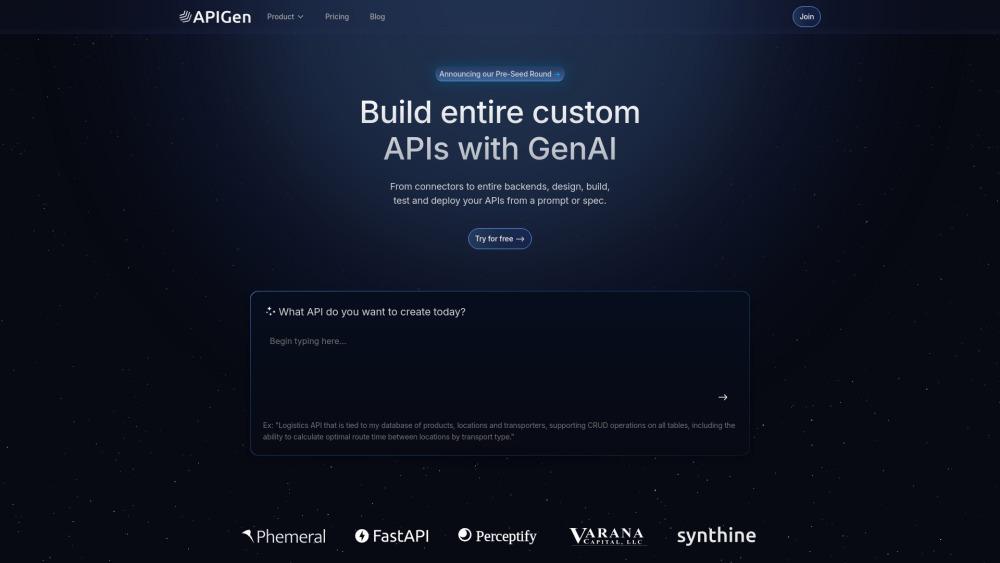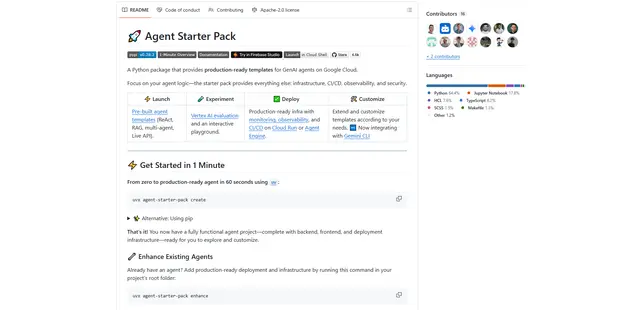APIGen
APIGen è una piattaforma potenziata dall'IA che consente agli utenti di creare, testare e distribuire API personalizzate da prompt o specifiche in pochi minuti.
https://www.apigen.com/?utm_source=aipure

Informazioni sul Prodotto
Aggiornato:May 9, 2025
Cos'è APIGen
APIGen è una piattaforma innovativa che sfrutta l'intelligenza artificiale per rivoluzionare lo sviluppo delle API. Consente agli utenti di generare intere API personalizzate, dai connettori ai backend completi, utilizzando comandi o specifiche in linguaggio naturale. APIGen mira a semplificare e accelerare il processo di creazione delle API, rendendolo accessibile sia agli sviluppatori che agli utenti non tecnici. La piattaforma copre l'intero ciclo di vita delle API, inclusi design, costruzione, test e distribuzione, il tutto all'interno di un ambiente integrato.
Caratteristiche principali di APIGen
APIGen è una piattaforma alimentata dall'IA che consente agli utenti di progettare, costruire, testare e distribuire API personalizzate a partire da prompt o specifiche. Genera strutture API complete, comprese rotte, schemi e funzionalità interne, con funzionalità di sicurezza integrate, capacità di test e la possibilità di integrarsi con database e altri servizi. APIGen utilizza un modello linguistico ottimizzato per creare API robuste e distribuibili rapidamente ed efficientemente.
Generazione API Alimentata dall'IA: Crea intere strutture API a partire da semplici prompt testuali o specifiche utilizzando un modello linguistico iper-ottimizzato.
Pipeline di Sviluppo End-to-End: Progetta, costruisci, testa e distribuisci API tutto all'interno di una singola piattaforma, dal concetto iniziale al codice pronto per la produzione.
Sicurezza e Autenticazione Integrate: Funzionalità integrate per la gestione degli utenti, generazione di token e crittografia dei dati per garantire sicurezza di livello enterprise.
Test e Documentazione Automatici: Genera test e documentazione personalizzati automaticamente per ogni API per garantire affidabilità e facilità d'uso.
Integrazioni Flessibili: Collegati a vari database, API di terze parti e altri servizi per creare soluzioni API complete.
Casi d'uso di APIGen
Prototipazione Rapida: Genera rapidamente prototipi API per startup o nuovi progetti per convalidare idee e dimostrare concetti.
Modernizzazione dei Sistemi Legacy: Crea interfacce API moderne per sistemi legacy per migliorare l'interoperabilità e ampliare la funzionalità.
Implementazione di Logica Aziendale Personalizzata: Sviluppa API con logica aziendale complessa per esigenze specifiche del settore, come logistica o servizi finanziari.
Architettura a Microservizi: Costruisci e distribuisci rapidamente singoli microservizi per supportare architetture di sistema scalabili e distribuite.
Vantaggi
Riduce significativamente il tempo e lo sforzo di sviluppo delle API
Fornisce una soluzione completa dalla progettazione alla distribuzione
Include funzionalità di sicurezza e test robuste pronte all'uso
Svantaggi
Potrebbe richiedere ottimizzazioni o regolazioni manuali per casi d'uso altamente specifici o complessi
Potenziale curva di apprendimento per gli utenti non familiari con gli strumenti di sviluppo assistiti dall'IA
Come usare APIGen
Registrati per un account APIGen: Vai sul sito web di APIGen e registrati per un account gratuito per accedere alla piattaforma.
Inserisci il tuo prompt API: Nella dashboard di APIGen, inserisci un prompt che descriva l'API che desideri creare. Sii il più specifico possibile riguardo alla funzionalità di cui hai bisogno.
Esamina e modifica le rotte/punti finali suggeriti: APIGen suggerirà rotte e punti finali in base al tuo prompt. Esamina questi suggerimenti e apporta eventuali modifiche o aggiunte necessarie.
Verifica e modifica gli schemi generati: Controlla gli schemi generati per ogni rotta e modificali se necessario per soddisfare i tuoi requisiti.
Esamina e modifica il codice del servizio generato: APIGen genererà il codice del servizio per la tua API. Esamina questo codice e utilizza l'editor integrato per apportare eventuali aggiustamenti.
Esegui test automatici: APIGen genererà ed eseguirà test automatici per la tua API. Esamina i risultati dei test per assicurarti che tutto funzioni come previsto.
Distribuisci o scarica la tua API: Una volta soddisfatto della tua API, puoi distribuirla istantaneamente sui server cloud di APIGen o scaricare il codice per ospitarlo altrove.
FAQ di APIGen
APIGen è una piattaforma alimentata da intelligenza artificiale che consente agli utenti di generare API personalizzate da un semplice prompt o specifica. Può creare interi backend, comprese rotte, schemi e funzionalità interne, con test e funzionalità di sicurezza integrate.
Post Ufficiali
Caricamento...Articoli Popolari

Strumenti di IA più popolari del 2025 | Aggiornamento 2026 di AIPURE
Feb 10, 2026

Moltbook AI: la prima rete sociale di agenti AI puri del 2026
Feb 5, 2026

ThumbnailCreator: Lo strumento di intelligenza artificiale che risolve lo stress delle miniature di YouTube (2026)
Jan 16, 2026

Occhiali Smart AI 2026: Una prospettiva software-first sul mercato dell'AI indossabile
Jan 7, 2026
Analisi del Sito Web di APIGen
Traffico e Classifiche di APIGen
0
Visite Mensili
-
Classifica Globale
-
Classifica di Categoria
Tendenze del Traffico: Aug 2024-Jun 2025
Approfondimenti sugli Utenti di APIGen
-
Durata Media della Visita
0
Pagine per Visita
0%
Tasso di Rimbalzo degli Utenti
Principali Regioni di APIGen
Others: 100%







